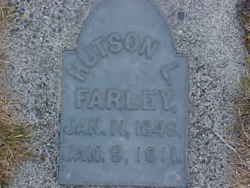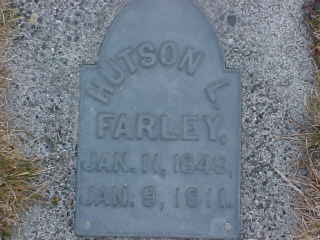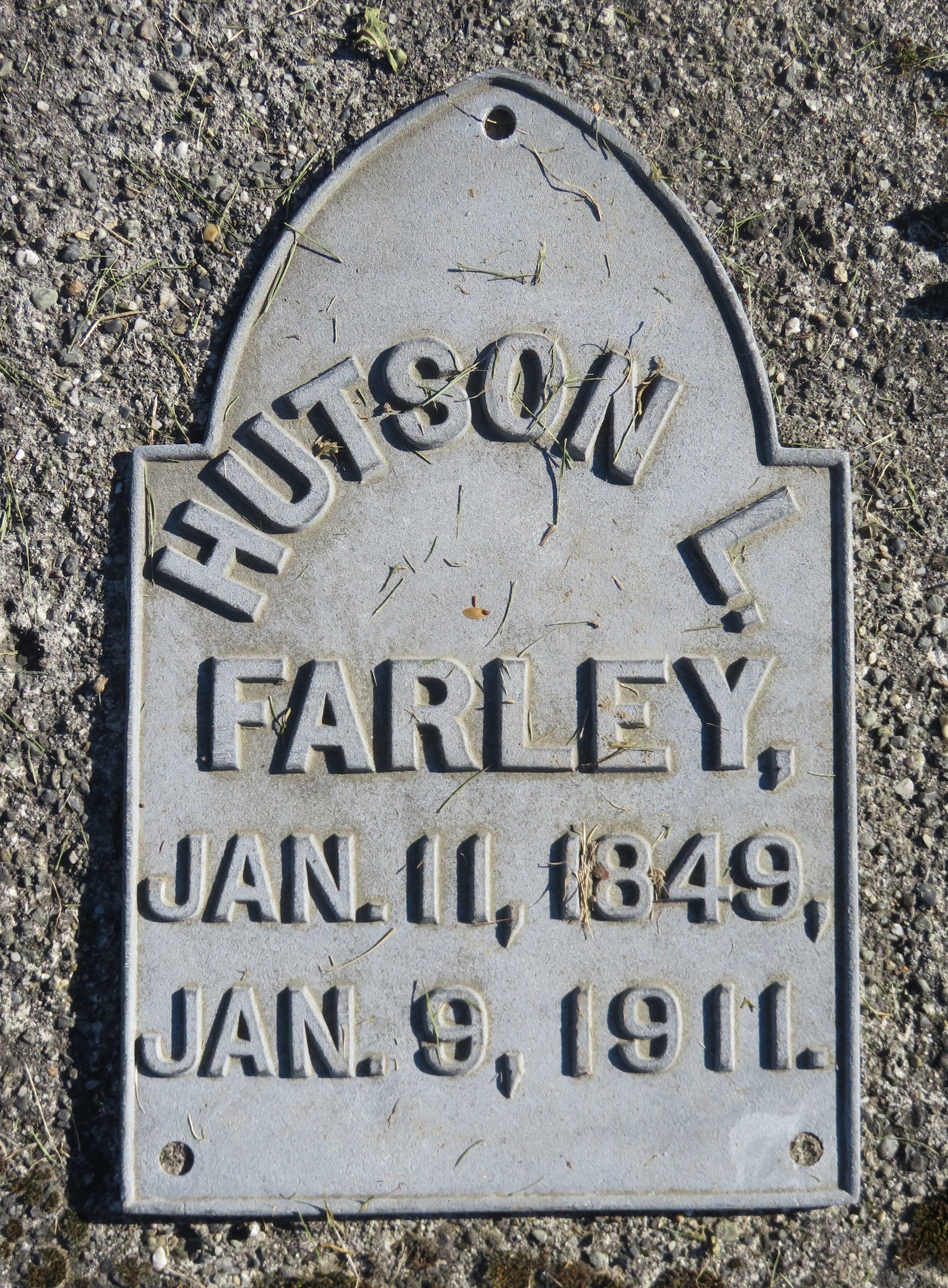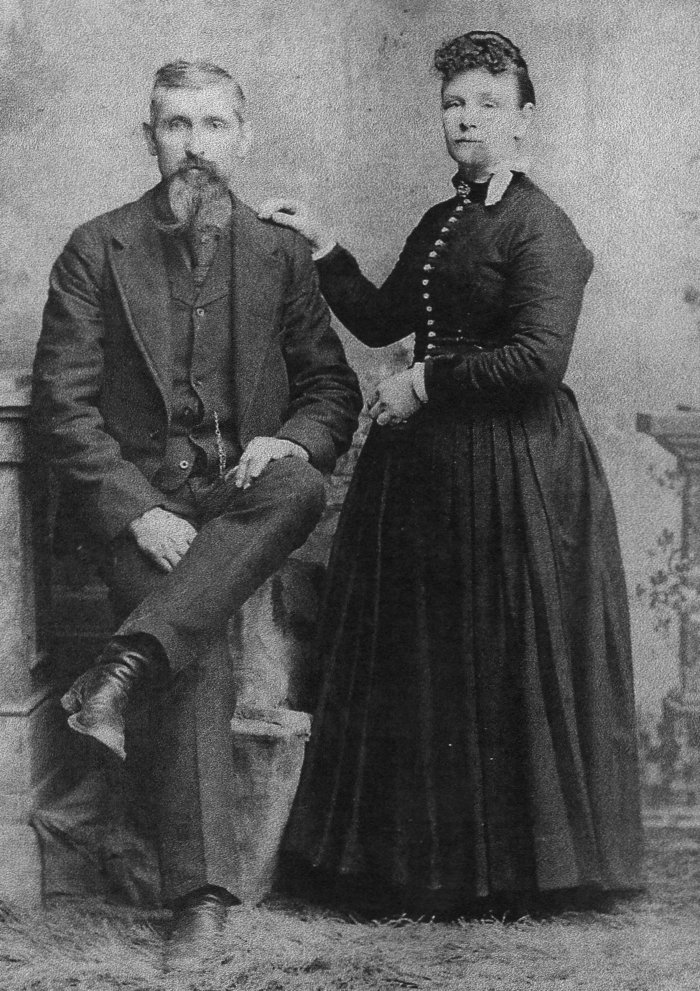At daybreak on September 17, 1868 Forsyth and his 50 scouts were attacked by Roman Nose's warriors in eastern Colorado Territoy, in what would become known as the Battle of Beechers island. The battle lasted three days, but by then half of the scout were dead or wounded and all of their horses and mules were killed and they could not leave the island. They were living on horse and mule meat. On September 26, 1868, Carpenter and his Buffalo Soldiers arrived to relieve the scouts.
Hutson's father, who was wounded at the start of the fighting, fought the entire time, but died following the removal of his shattered leg.
**********************************
Skagit County Times
Sedro Woolley, Washington
Thursday, January 12, 1911
Death takes H. L. Farley
Passes Suddenly to the beyond Last Monday Morning
The death of Hutson L. Farley, familiarly known among a host of friends as "Hutch" Farley, occurred at his home in this cuty at 2:30 o'clock Monday morning. (Jan. 9.) His death was the result of heart failure and was sudden and totally unexpected.
Deceased was born in Noblesville, Indiana, on January 11, 1849. He left home at the age of 16 and went to Lincoln County Kansas. It was then he entered the service of the United States Government as a scout in the Indian wars that disturbed the west for years. He gave the government six years of faithful service as ever distinguished any man similarly employed. He was married in Kansas on October 10th, 1870 to Miss Eugenia L. Phelps. Six children were born to this union, three of whom together with his wife, three grandchildren and two sisters survive him. The three living children are Mrs. Ed Nelson of this city, Mrs. Lizzie Knutson of Allan, Washington and Mrs. Alta Weston of Seattle. In 1881 he came with his family to Pierce County in this state where he took up a homestead and lived until 1898. He then came to Sedro Wooley where himself and wife have resided until the time of his death. His avocation was carpentering and mill-wrighting. Funeral will be Friday at the Presbyterian Church at 2:30 pm, Reverend F.G. Strange officiating. Deceased was a member of the I.O.O.F., under whose auspices the funeral services will be conducted.
Whether the life of a frontiersman was a matter of choice to Hutch Farley or not it has dominated the past 46 years of his life, and his experiences of hunting and adventure in that time would make as finely interesting in reading as that of most men of wider fame. While he was a man of intelligence, it was an intelligence gained by communion with nature and association with the crudest as well as the best graduates of the same school. He was a man of unlimited courage and deep conviction. Whatever may have been his mistakes he was always just and earnest in trying to arrive at final conclusions. He knew and could tolerate or condone the faults and weakness of white men within respectable limits, but few Indians ever possessed sufficient virtue to command his respect. His earlier experiences on the frontier precluded the possibility of such a thing. Farley was a good husband, a good father a splendidly reliable neighbor and a remarkably good marksman with a gun. In an emergency of war he was a man to be looked to, and he never disappointed any expectations of duty well done assigned to him. He was firm, constant and reliable in friendship, and seldom cherished enmity against men with white skins and character. He was thoughtful of every contemplated or committed act, and was slow to anger. Tolerant of the faults of others he had learned well to retain his own and seldom yielded to impulse. Every man is his debtor to the extent that his life work, in whole or in part, blazed the way westward for the oncoming civilization. He crowded the limits of the frontier very near to its extreme and to the extent of his life.
He studied and knew the great expanse of country which afforded opportunity for his adventurous career extending over a period of the best years of his life. All things to him, aside from his consideration for those he loved and appreciated, were ever matter of fact - incidents that go to make up life, and to be taken as they came and appreciated in accordance with their worth. Wherever chance led there duty lay in the sights of Hutch Farley.
While serving as a scout in the service of the government fate cast his lot with that of General Forsyth in that brave leader's mad rush after hostile Indians into the valley of the Arickeree at the head of 50 men. Perhaps that raid resulted in the closest call Hutch ever had. There in the hastily made and shallow trenches upon a little island in the midst of a shallow stream, that little band, lived upon tainted horse flesh and wolf meat, successfully resisted every effort of 800 infuriated savages to dislodge them, and it was there that Hutch's father was killed and Hutch himself badly wounded through the shoulder. For all of his injuries he never quit fighting nor uttered a complaint. When injury threatened his companions it was Hutch's gun and unerring aim which were relied upon to eliminate the danger. He never disappointed. Every time his rifle cracked his companions chances were enhanced by one. General Forsyth has told the tale of the fight and sung praised of Hutch Farley's courage and endurance. General Forsyth never told how he led the way into a trap and led his followers after him and Hutch seldom mentioned it. After that action came Hutch's term of peace until the grim old destroyer grappled him without warning in the darkness of Monday morning.
Only a minute or so before death fastened its grip upon him he had arisen from his bed to raise or lower a window. He complained to his wife of not feeling well. A few minutes after lying down his gasping and labored breathing alarmed his wife. On arising and examining him Mrs. Farley found him partially unconscious. Other of the family were hurriedly called to his bedside. Hutch never regained consciousness but steadily advanced to the long sleep that knows no wakening on Earth. Every friend has lost good friendship; if Hutch had enemies they have little to forgive. Peace to his soul.
In this connection we are authorized by Noble Grand Ed Nelson to ask all members of Truth Lodge to appear at the hall by one o'clock on Friday afternoon for the purpose of taking charge of the funeral. Turnout brothers, as it is one of our obligations to bury the dead.
At daybreak on September 17, 1868 Forsyth and his 50 scouts were attacked by Roman Nose's warriors in eastern Colorado Territoy, in what would become known as the Battle of Beechers island. The battle lasted three days, but by then half of the scout were dead or wounded and all of their horses and mules were killed and they could not leave the island. They were living on horse and mule meat. On September 26, 1868, Carpenter and his Buffalo Soldiers arrived to relieve the scouts.
Hutson's father, who was wounded at the start of the fighting, fought the entire time, but died following the removal of his shattered leg.
**********************************
Skagit County Times
Sedro Woolley, Washington
Thursday, January 12, 1911
Death takes H. L. Farley
Passes Suddenly to the beyond Last Monday Morning
The death of Hutson L. Farley, familiarly known among a host of friends as "Hutch" Farley, occurred at his home in this cuty at 2:30 o'clock Monday morning. (Jan. 9.) His death was the result of heart failure and was sudden and totally unexpected.
Deceased was born in Noblesville, Indiana, on January 11, 1849. He left home at the age of 16 and went to Lincoln County Kansas. It was then he entered the service of the United States Government as a scout in the Indian wars that disturbed the west for years. He gave the government six years of faithful service as ever distinguished any man similarly employed. He was married in Kansas on October 10th, 1870 to Miss Eugenia L. Phelps. Six children were born to this union, three of whom together with his wife, three grandchildren and two sisters survive him. The three living children are Mrs. Ed Nelson of this city, Mrs. Lizzie Knutson of Allan, Washington and Mrs. Alta Weston of Seattle. In 1881 he came with his family to Pierce County in this state where he took up a homestead and lived until 1898. He then came to Sedro Wooley where himself and wife have resided until the time of his death. His avocation was carpentering and mill-wrighting. Funeral will be Friday at the Presbyterian Church at 2:30 pm, Reverend F.G. Strange officiating. Deceased was a member of the I.O.O.F., under whose auspices the funeral services will be conducted.
Whether the life of a frontiersman was a matter of choice to Hutch Farley or not it has dominated the past 46 years of his life, and his experiences of hunting and adventure in that time would make as finely interesting in reading as that of most men of wider fame. While he was a man of intelligence, it was an intelligence gained by communion with nature and association with the crudest as well as the best graduates of the same school. He was a man of unlimited courage and deep conviction. Whatever may have been his mistakes he was always just and earnest in trying to arrive at final conclusions. He knew and could tolerate or condone the faults and weakness of white men within respectable limits, but few Indians ever possessed sufficient virtue to command his respect. His earlier experiences on the frontier precluded the possibility of such a thing. Farley was a good husband, a good father a splendidly reliable neighbor and a remarkably good marksman with a gun. In an emergency of war he was a man to be looked to, and he never disappointed any expectations of duty well done assigned to him. He was firm, constant and reliable in friendship, and seldom cherished enmity against men with white skins and character. He was thoughtful of every contemplated or committed act, and was slow to anger. Tolerant of the faults of others he had learned well to retain his own and seldom yielded to impulse. Every man is his debtor to the extent that his life work, in whole or in part, blazed the way westward for the oncoming civilization. He crowded the limits of the frontier very near to its extreme and to the extent of his life.
He studied and knew the great expanse of country which afforded opportunity for his adventurous career extending over a period of the best years of his life. All things to him, aside from his consideration for those he loved and appreciated, were ever matter of fact - incidents that go to make up life, and to be taken as they came and appreciated in accordance with their worth. Wherever chance led there duty lay in the sights of Hutch Farley.
While serving as a scout in the service of the government fate cast his lot with that of General Forsyth in that brave leader's mad rush after hostile Indians into the valley of the Arickeree at the head of 50 men. Perhaps that raid resulted in the closest call Hutch ever had. There in the hastily made and shallow trenches upon a little island in the midst of a shallow stream, that little band, lived upon tainted horse flesh and wolf meat, successfully resisted every effort of 800 infuriated savages to dislodge them, and it was there that Hutch's father was killed and Hutch himself badly wounded through the shoulder. For all of his injuries he never quit fighting nor uttered a complaint. When injury threatened his companions it was Hutch's gun and unerring aim which were relied upon to eliminate the danger. He never disappointed. Every time his rifle cracked his companions chances were enhanced by one. General Forsyth has told the tale of the fight and sung praised of Hutch Farley's courage and endurance. General Forsyth never told how he led the way into a trap and led his followers after him and Hutch seldom mentioned it. After that action came Hutch's term of peace until the grim old destroyer grappled him without warning in the darkness of Monday morning.
Only a minute or so before death fastened its grip upon him he had arisen from his bed to raise or lower a window. He complained to his wife of not feeling well. A few minutes after lying down his gasping and labored breathing alarmed his wife. On arising and examining him Mrs. Farley found him partially unconscious. Other of the family were hurriedly called to his bedside. Hutch never regained consciousness but steadily advanced to the long sleep that knows no wakening on Earth. Every friend has lost good friendship; if Hutch had enemies they have little to forgive. Peace to his soul.
In this connection we are authorized by Noble Grand Ed Nelson to ask all members of Truth Lodge to appear at the hall by one o'clock on Friday afternoon for the purpose of taking charge of the funeral. Turnout brothers, as it is one of our obligations to bury the dead.
Family Members
Sponsored by Ancestry
Advertisement
Advertisement















